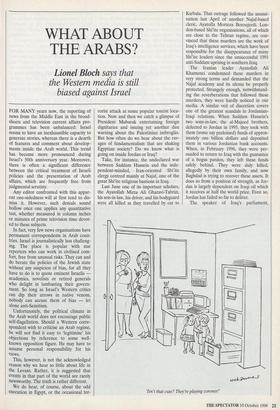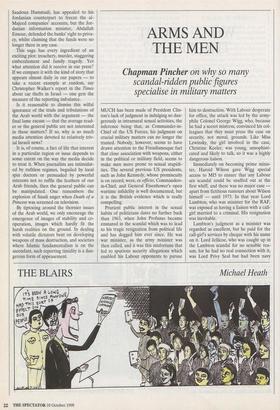WHAT ABOUT THE ARABS?
Lionel Bloch says that
the Western media is still biased against Israel
FOR MANY years now, the reporting of news from the Middle East in the broad- sheets and television current affairs pro- grammes has been unbalanced: Israel seems to have an inexhaustible capacity to generate stories, whereas there is a dearth of features and comment about develop- ments inside the Arab world. This trend has become more pronounced during Israel's 50th anniversary year. Moreover, there is often a significant difference between the critical treatment of Israeli policies and the presentation of Arab affairs, which are frequently free from judgmental scrutiny.
Any editor confronted with this appar- ent one-sidedness will at first tend to dis- miss it. However, such denials sound hollow once one applies any quantitative test, whether measured in column inches or minutes of prime television time devot- ed to these subjects.
In fact, very few news organisations have permanent correspondents in Arab coun- tries. Israel is journalistically less challeng- ing. The place is popular with star reporters who can work in civilised com- fort, free from unusual risks. They can and do berate the policies of the Jewish state without any suspicion of bias, for all they have to do is to quote eminent Israelis — academics, novelists or retired generals who delight in lambasting their govern- ment. So long as Israel's Western critics can dip their arrows in native venom, nobody can accuse them of bias — let alone anti-Semitism.
Unfortunately, the political climate in the Arab world does not encourage public self-flagellation. Should a Western corre- spondent wish to criticise an Arab regime, he will not find it easy to 'legitimise' his objections by reference to some well- known opposition figure. He may have to assume personal responsibility for his views.
This, however, is not the acknowledged reason why we hear so little about life in the Levant. Rather, it is suggested that events in that part of the world are rarely newsworthy. The truth is rather different.
We do hear, of course, about the odd execution in Egypt, or the occasional ter- rorist attack at some popular tourist loca- tion. Now and then we catch a glimpse of President Mubarak entertaining foreign dignitaries and issuing yet another dire warning about the Palestinian imbroglio. But how often do we hear about the rav- ages of fundamentalism that are shaking Egyptian society? Do we know what is going on inside Jordan or Iraq?
Take, for instance, the undeclared war between Saddam Hussein and the inde- pendent-minded, Iran-oriented Shi'ite clergy centred mainly at Najaf, one of the great Shi'ite religious bastions in Iraq.
Last June one of its important scholars, the Ayatollah Mirza Ali Gharavi-Tabrizi, his son-in-law, his driver, and his bodyguard were all killed as they travelled by car to Karbala. That outrage followed the assassi- nation last April of another Najaf-based cleric, Ayatolla Morteza Boroujerdi. Lon- don-based Shi'ite organisations, all of which are close to the Tehran regime, are con- vinced that these murders are the work of Iraq's intelligence services, which have been responsible for the disappearance of many Shi'ite leaders since the unsuccessful 1991 anti-Saddam uprising in southern Iraq.
The Iranian leader Ayatollah Ali Khamenei condemned these murders in very strong terms and demanded that the Najaf academy and its ulema be properly protected. Strangely enough, notwithstand- ing the reverberations that followed these murders, they were hardly noticed in our media. A similar veil of discretion covers one of the greatest scandals in Jordanian- Iraqi relations. When Saddam Hussein's two sons-in-law, the al-Majeed brothers, defected to Jordan in 1995, they took with them (some say purloined) funds of approx- imately one billion dollars and deposited them in various Jordanian bank accounts. When, in February 1996, they were per- suaded to return to Iraq with the guarantee of a bogus pardon, they left these funds safely behind. They were duly killed, allegedly by their own family, and now Baghdad is trying to recover these assets. It does so from a position of strength, as Jor- dan is largely dependent on Iraqi oil which it receives at half the world price. Even so, Jordan has failed so far to deliver.
The speaker of Iraq's parliament, 'Isn't that cute? They're playing coroner!' Saadoun Hammadi, has appealed to his Jordanian counterpart to freeze the al- Majeed companies' accounts, but the Jor- danian information minister, Abdallah Ensour, defended the banks' right to priva- cy, whilst claiming that the funds were no longer there in any case.
This saga has every ingredient of an exciting plot: treachery, murder, staggering embezzlement and family tragedy. Yet what attention did it receive in our press? If we compare it with the kind of story that appears almost daily in our papers — to take a recent example at random, say Christopher Walker's report in the Times about car thefts in Israel — one gets the measure of the reporting imbalance.
Is it reasonable to dismiss this wilful ignorance of the trials and tribulations of the Arab world with the argument — the final lame excuse — that the average read- er or the general public are not interested in these matters? If so, why is so much media attention devoted to relatively triv- ial Israeli news?
It is, of course, a fact of life that interest in a particular region or issue depends to some extent on the way the media decide to treat it. When journalists are intimidat- ed by ruthless regimes, beguiled by local spin doctors or persuaded by powerful interests not to ruffle the feathers of our Arab friends, then the general public can be manipulated. One remembers the explosion of Saudi anger when Death of a Princess was screened on television.
By tiptoeing around the thornier issues of the Arab world, we only encourage the emergence of images of stability and co- operation, images which hardly fit the harsh realities on the ground. In dealing with volatile dictators bent on developing weapons of mass destruction, and societies where Islamic fundamentalism is on the ascendant, such reporting timidity is a dan- gerous form of appeasement.











































































 Previous page
Previous page